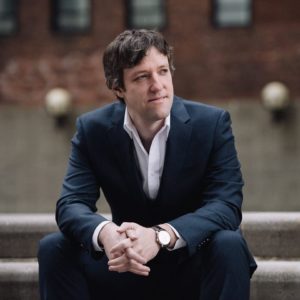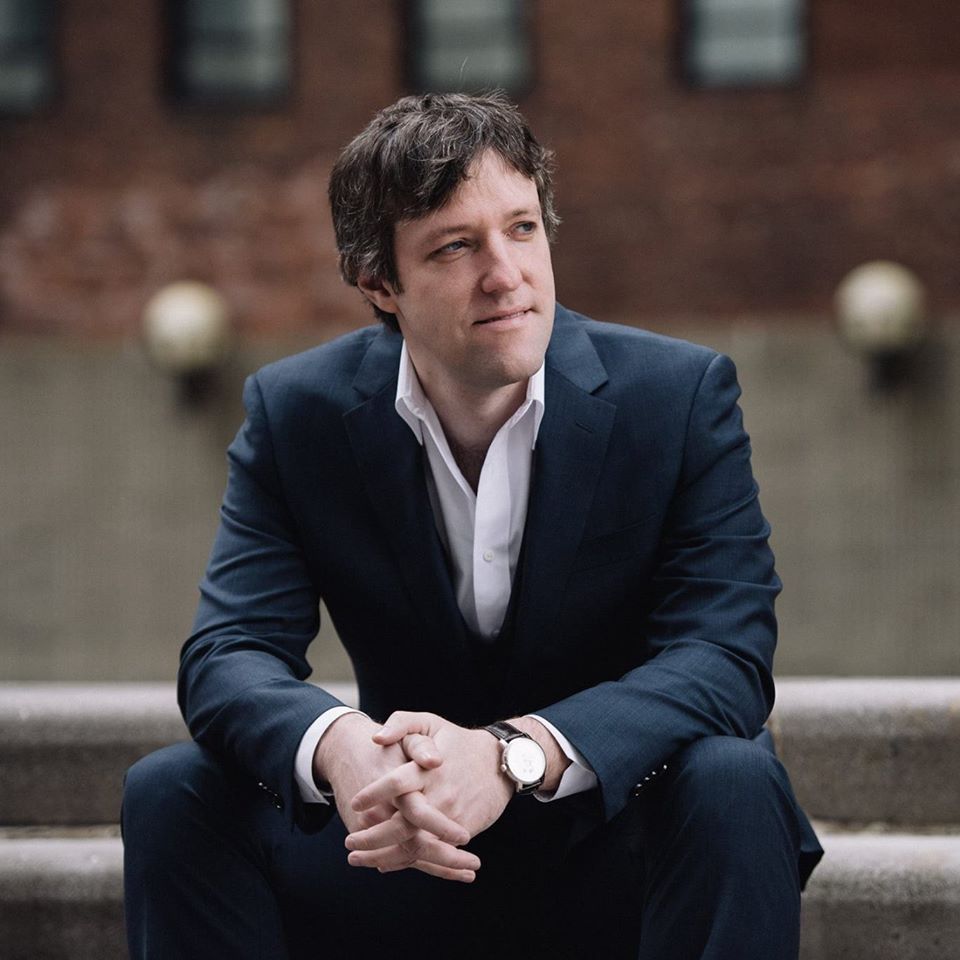Conductor adds one woman composer to each concert
mainAt the New Bedford Symphony Orchestra music director Yaniv Dinur is including a woman composer in every concert this season.
More here.


At the New Bedford Symphony Orchestra music director Yaniv Dinur is including a woman composer in every concert this season.
More here.

The autograph manuscript of the fourth movement of…

We have been notified of the passing of…

Franz Welser-Möst has pulled out of the opening…

Elvis If he had lived, Elvis would have…

Session expired
Please log in again. The login page will open in a new tab. After logging in you can close it and return to this page.
Regardless. He is a very very good doncuctor
So. On equality rather than merit?
Why do you assume that pieces by women do not merit to be played?
You make the automatic assumption that he’ll play crap composed by women because there is nothing that is worthy of inclusion on its own merits. Why? Don’t you think women can compose good music?
See Emil’s post of 12 October 23:55h for a cogent response to your “question”… if you’re interested in one.
Why not. There’s enough decent music out there written by women that deserves to be programmed at least as much as all the mediocre-to-bad music written by men that is already programmed.
I’m curious to know what music by male composers you consider to be ‘mediocre-to-bad’. As you should know by now, I’m not one of Slipped Disc’s resident misogynist trolls, so this is a genuine question. I’m wondering whether you mean music that has entered the canon but that isn’t actually that good or contemporary pieces that aren’t that good. It’s not clear whether your idea of ‘mediocre-to-bad music written by men’ is, say, Tchaikovsky’s first piano concerto or Shostakovich’s second piano concerto, both admirable works, but perhaps played a little more often than they deserve, or whether you mean composers like Thomas Adès and Mark-Anthony Turnage.
All of the above. I don’t know anything by Ades or Turnage; but for instance there’s Rimsky-Korsakov’s Capriccio Espagnole, which the more I hear the farther from first-rate it sounds. My orchestra has programmed tons of music by new young composers, including Mazzoli, Cline, and Bates and their contemporaries whose names don’t come to mind but who are almost all male. Not sure if there is a single piece in the bunch that I would be interested in hearing again. (Programming music because the composer is still alive is just as valid a reason as programming it because the composer is female.)
To take another example, of an actually (IMHO) good composer: Jennifer Higdon. Is “blue cathedral” really the only decent piece she’s written? Because that’s the only thing of hers I’ve ever played, or that anyone I know has ever played.
I would ramble more, but I have to get to rehearsal.
Another mediocre-to-bad-by-a-male-composer piece that comes to mind is Offenbach’s Gaité Parisienne.
After a fairly terrible rehearsal of part of Capriccio Espagnol (along with about 12 other things, all Russian and difficult, for a Cirque de la Symphonie concert), I’m feeling a little more kindly disposed toward it… but less so toward Khachaturian and Kabalevsky.
So, a bit of both really. I’m never sure whether there are some pieces from the standard concert repertoire that I end up being a bit down on just because they’re played so often. The first time I played the Shostakovich piano concerto no. 2 I was completely bowled over by it, and maybe it’s a bit unkind to end up enjoying it less because it’s done so often. The Kenneth MacMillan ballet is fantastic though… I also can never quite decide whether Pachelbel’s Canon is absolutely brilliant or absolutely awful. It’s played far too often, and often not very well, but I guess that is basically because it’s a piece people really like.
I’m not a huge fan of a lot of contemporary composers, but my indifference/dislike is strictly gender neutral. I like Arvo Pärt, Sofia Gubaidulina, Krzysztof Penderecki, Pēteris Vasks, and some Philip Glass and John Adams. There are a lot of men there, I know, but that’s hopefully outweighed by the strength of my dislike of Harrison Birtwistle. Perhaps wrongly, I don’t pay a whole lot of attention to younger and less well known composers, often simply because their music doesn’t make much of an impression on me. A few years ago I went to a performance of Tansy Davies’s opera Between Worlds. I didn’t exactly dislike it, but it just didn’t have much of an impact on me. Likewise I caught the premiere of a work by Sally Beamish, which I didn’t hate, but nor was it remotely memorable. Arguably they must at least have made more of an impression than some male composers that I’ve heard, as I do at least remember the performances even if I don’t remember the music.
Jennifer Higdon’s Blue Cathedral is really very good. And decent as well. The reason that a successful new piece is played many more times afterwards instead of other pieces by the same composer, is because it is a safe choice, and programming it also saves time: you don’t have to delve into her other music and have an independent aesthetic opinion.
I’m offended that there are no black transgendered asexual vegan composers slated to be played this season. Such hatred! Shame him into programing these underrepresented composers!
LOL, LGBTTIX or any other letter I miss.
Composers should be chosen to be programmed based on the quality of their music, not their genitalia.
Gone are the days when Private Eye in a spoof Radio 3 schedule had 09.00 Masterpieces by Female Composers, 09.05 Beethoven….
There is not a large enough pool of women classical composers, never mind GOOD women compoosers, to last more than 1.5 seasons. If he gets back as far as this lady, call me!!
https://en.m.wikipedia.org/wiki/Barbara_Strozzi
To all you haters, what the hell do you care what the New Bedford Symphony is doing? Are you all moving to New Bedford? And your only cultural outing will be a subscription to the New Bedford Symphony? And you’ll be disconnecting your radio and internet connection? And you’ll be deprived of dead white male composers the rest of your living days on earth?
Nobody is taking away your guns and religion, y”all don’t need to cling to your dead white males.
What, as Trump said, it’s “a very scary time for young men in America”?
Anon: The problem is that the further one gets from a meritocracy the closer one gets to becoming a mediocrity. I don’t think institution racial and gender bias is the antidote to perceived bias.
1- Again, there is no one – no one ever – who suggests that bad music by women should be played. There is absolutely nothing to suggest merit is not crucial. To take another example, if I say I want to read a crime novel (as opposed to the best novel possible), I’m not going to automatically read whatever trash crime novel comes into my hands. Because there are additional criteria doesn’t mean quality isn’t the most important one.
2- Well, the point is that institutionalized (and institutional) biases are there whether you like it or not. When an orchestra’s ‘core’ repertoire is composed solely of men, well, that does not leave much room for women. That is a form of bias: orchestras run with what they know, and the public overwhelmingly like what they know, which happens to be, well, music written by men (again, I am not saying orchestras should not play Beethoven and Mozart).
So, there is institutionalized bias, and that bias will perpetuate itself unless it is corrected. Therefore it must be corrected, and playing (high-quality) music by women is one way to rectify that.
There is no exclusion in the current programing that presents mostly music of white males, if they were the predominant practitioners. Probability theory would say that even if merit meant nothing and compositions were chosen at random for performance, white males would dominate the repertoire. IF there is institutional bias against women, are you believe, then put in place a structure that removes bias (such as the screened audition) rather than replace the alleged bias with undeniable bias against men. Seems obvious.
So the equivalent of a screened audition for a piece of music would be, I guess, to play it for the audience without telling them who wrote it…?
Actually it’s an intriguing idea: “Subscribe to our Season Of Mystery Overtures! We will open each concert with a new piece of music and won’t tell you what it is or who wrote it until it’s over.” I wonder how many people it would attract vs. repel. You might have (like my orchestra had when we played very new music as an opener for every concert) a contingent of the audience who purposely arrives 15 minutes late in order to miss the part of the concert they don’t want to hear…
Anyway, over the course of the Mystery Overture Season, it might turn out that all the Mystery Overtures had been written by women. That would be fine, I guess, but there would be no way to attract audience members who might be intrigued if they knew there was a female composer on the program. Hmm.
Dude, you’re making my point for me.
Also, you think m’en came to dominate composition by random accident? If so, Constance Mozart, Fanny Mendelssohn, Clara Schumann, Alma Mahler, and bazillions other women would like to have a word.
The fact that an overwhelming majority of written pieces were written by men *is* institutionalized bias.
Agreed. Only one comment; the fact that the core repertoire has been written by men is not a bias. It is a historical fact, which is another category. Those men could not help it to be born in a society which deemed women good enough to be painters but not composers.
It is quite possible that if Leopold Mozart had spent the same amount of care to his daughter Nannerl, both his children could have ended-up as great composers. We simply cannot know. The same goes for Mendelssohn and his sister.
The whole idea of female composers in our time is a very interesting experiment with unsure outcome. What will the music world conclude if, after another couple of decennia of female new music flowering, the females’ output is, on average, as bad as that of the males’?
https://www.youtube.com/watch?v=QjSBBz7gh28
I see two problems with an emphasis on new music by female composers:
1. Most new music isn’t very good, no matter who wrote it. Of course, in the past most new music was also not very good. What we are left with today is what was considered good enough to preserve. Although arguably most music in the past, however mediocre, was probably more pleasant to listen to than a lot of music today.
2. It takes a long time for consensus to settle on what’s good and what isn’t. Even with regard to the second half of the 20th century (and excluding composers still alive today), how many composers are now established as having been truly great? Britten, Shostakovich, Tippett, Poulenc, Messiaen, Duruflé, Copland, Bernstein, Górecki, Panufnik, Lutosławski, Khachaturian. There are probably some more, but my point is that it will be longer than twenty years before we can say which composers working today will stand the test of time. Maybe Arvo Pärt and Sofia Gubaidulina have already secured their legacy, but they are both in their 80s. I think the jury’s still out on how music history will treat the likes of Boulez and Stockhausen, let alone less famous names such as Judith Weir and Peter Maxwell Davies.
Let’s agree on ‘historically entrenched bias’, shall we? Structures are, by definition, historical.
Again, no one has suggested Beethoven, Mozart, or any other composer is to blame for the fact that he wrote great works while a woman did not. But, structural constraints, whether historical or contemporary, still exist and matter. And a sexist historical structure is still sexist.
Emil: Regarding literature v. music.
Personally I think it possible to have an all-female reading list of great literature in the English language without being absurd. (It would included Jane Austin, George Eliot , Bronte among others). But we can’t do something similar for classical music.
There is plenty of great music by female composers. And as admirable as the idea is, it is not new. 15 years ago, the Jena Philhamonic (then conductor Boreyko) devoted an entire season partly to music by female composers. I remember fondly the many great – and virtually unknown – pieces from that year.
By “partly” I meant that there was at least one piece in every concert of the season.
A very good initiative which should be followed everywhere.
My impression so far is that female composers are not worse or better than male ones, and some of the females are positively scary:
https://www.youtube.com/watch?v=QYeP0inBQ0M
No scarier than this composer: https://tinyurl.com/ya7zfz3k
Or this one: https://tinyurl.com/yb2noqmf
😉
But the first had his redeeming moments.
With that season? I’d have no complaints. Except perhaps with Tchaikovsky’s Fifth Symphony.
https://www.nbsymphony.org/season-at-a-glance/
I’d like to see many more 20th century American composers performed, dead, white, male, or otherwise, including: William Schuman, Roy Harris, and Samuel Barber. There is so much great American music that is not being played at all. Bernstein and Gerard Schwarz are the only conductors that I can recall programming this music regularly. I think that it is at least as important to play great music that is already out there out as it is to look around for a hand full of women to feature, which is really more of a political statement than an artistic one.
You also left out Leonard Slatkin, who also programmed a lot of American composers,, known or unknown, dead or alive, male or female, black, white or Latino, as well as JoAnn Falletta, Marin Alsop and other conductors who have gone out of their way to program a vast number of American composers. But like you said, there are a lot of great American composers that are not being programmed enough or not at all, ranging from 19th century composers such as George Frederick Bristow, Horatio Parker and John Knowles Paine, to early 20th century composers such as Henry Hadley and John Alden Carpenter, to a slew of composers from the end of the last century into the first quarter of this one.
And since we’re on the subject of women composers, I don’t see anyone programming the music of Radie Britain, Elinor Remick Warren, Julia Perry, Vivian Fine, Miriam Gideon, Lucia Dlugoszewski, Barbara Kolb, Zenobia Powell Perry, Lettie Beckon Alston or Undine Smith Moore. These are composers whose music should also be considered.
Not enough. It should be 50% either by duration or by the number of notes.
…and don’t combine with a well-known masterpiece like Beethoven’s Eroica or take care in the order of the works. Two weeks ago, I heard “Eroica” of adrenaline maximum after hearing a beautiful Schoenberg. “Eroica” was great, but I wanted to hear Schoenberg last…it was hilarious that coincidentally there was his picture above.
Sorry, with ö……..
Jeez! What’s the gripe here? We’re talking about a four-concert season that includes essential repertoire by Mahler, Beethoven, Tchaikovsky, Bartok, Rachmaninoff, Barber and Richard Strauss. And alongside those, New Bedford Symphony’s patrons get to discover Lili Boulanger’s pair of “Matin/Soir” tone poems plus newer works by Vivian Fung, Zosha diCastri and Andrea Tarrodi.
The fewer programs are presented by an artistic organization to its audiences, the more important it is that each one of those programs makes MUSICAL sense, rather than making them conform to someone’s idea of whatever is deemed politically correct at the moment but is in reality nothing but an arbitrary sexist/racist/ageist/etc quota.
Who said they don’t make sense? Who said that gender was the *only* criterion?
You tell me, because I certainly did not say any such thing.